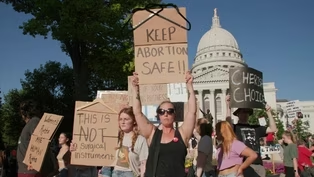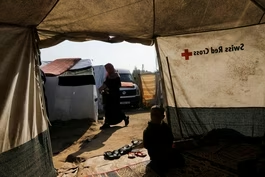
What to know about the COP28 deal to cut methane emissions
Clip: 12/2/2023 | 7m 47sVideo has Closed Captions
What to know about the COP28 deal and new U.S. rules to cut methane emissions
At COP28 on Saturday, 50 oil and gas companies — including industry giants ExxonMobil, Shell and BP — pledged to reduce methane emissions to “near zero” by 2030. At the same time, the Biden administration announced new rules to enforce major elements of the agreement in the U.S. Fred Krupp, president of the Environmental Defense Fund, joins John Yang to discuss the importance of this deal.
Problems playing video? | Closed Captioning Feedback
Problems playing video? | Closed Captioning Feedback
Major corporate funding for the PBS News Hour is provided by BDO, BNSF, Consumer Cellular, American Cruise Lines, and Raymond James. Funding for the PBS NewsHour Weekend is provided by...

What to know about the COP28 deal to cut methane emissions
Clip: 12/2/2023 | 7m 47sVideo has Closed Captions
At COP28 on Saturday, 50 oil and gas companies — including industry giants ExxonMobil, Shell and BP — pledged to reduce methane emissions to “near zero” by 2030. At the same time, the Biden administration announced new rules to enforce major elements of the agreement in the U.S. Fred Krupp, president of the Environmental Defense Fund, joins John Yang to discuss the importance of this deal.
Problems playing video? | Closed Captioning Feedback
How to Watch PBS News Hour
PBS News Hour is available to stream on pbs.org and the free PBS App, available on iPhone, Apple TV, Android TV, Android smartphones, Amazon Fire TV, Amazon Fire Tablet, Roku, Samsung Smart TV, and Vizio.
Providing Support for PBS.org
Learn Moreabout PBS online sponsorship50 oil and gas companies representing# about 40 percent o pledged to reduce methane emissions to near# zero by 2030.
Methane is a byproduct of oil## and gas production that can trap 80 times as# much heat as carbon dioxide in the short term.
The companies including industry# giants like Exxon Mobil, Shell and## BP say they'll achieve this by plugging leaks# at their facilities and ending th of burning off excess gas with flares.
The# same time the Biden administration announced## new rules to enforce major elements# of that agreement in this country.
Earlier, I spoke with Fred Krupp the# president of the Environmental Defense## Fund, who was at COP28.
I asked him# what makes this deal so important.
FRED KRUPP, President, Environmental# Defense Fund: John, I've been at this## for a lo I don't think we've ever had as good# a day for the climate as we had today.
First, we had the U.S. EPA announcing the# strongest methane rules for the oil and gas## sector on the planet.
Second, we had 50 companies# representing 40 percent of global oil production,## pledging to virtually eliminate their# methane pollution.
And then third,## we saw an announcement from the# U.S. and China that they've agreed## to incorporate methane in the future# into their pledges internationally.
And methane, John, is 80 times more powerful# as a greenhouse gas than carbon dioxide pound## for pound in those first 20 years.
And so# reductions now that will happen as a result## of these three actions mean that storms will be# less ferocious temperatures will be lower than## they would otherwise be over the next 10 years.# Thanks to the actions that were pledged today.
JOHN YANG: Is this a long term solution to the# problem is just a sort of short term quick fix.
FRED KRUPP: Well, we have to both do# methane to reduce temperatures in the## short term and we cannot stop working.# In fact, we have to accelerate our work## on eliminating carbon dioxide.
The oil# and gas industry took this one step.
But they have to do a lot more than this.# We have to move away from reliance or## dependency on fossil fuels as quickly as# we can.
But while we're still you them,## we have to eliminate this very# powerful greenhouse gas methane.
JOHN YANG: This agreement is voluntary.
The oil# companies have to do what they what they promised## to do.
And a lot of environmental groups don't# like that.
They say there's no accountability## mechanism or guarantee the companies will# follow through.
What do you say to that?
FRED KRUPP: Well, I think it's good to be# skeptical of pledges at the COP.
A lot of## pledges that have been made at this# Conference of the Parties year after## year aren't delivered on.
In this particular# pledge, we structured it to have built in.
So the oil and gas companies# are agreeing to report their emissions## by monitoring them and then sending them to# an international independent third party.
In addition to that, the Bloomberg Philanthropies# today announced a major $25 million gift to not## only the Environmental Defense Fund, but it will# stand up an accountability partnership, that will## make data transparent.
And so we'll be able to see# exactly who is meeting this pledge, and who's not.
JOHN YANG: But there's really# no teeth in that they sort of,## you're relying on public shaming, to just sort# of publicize that they're missing their go FRED KRUPP: It turns out that oil companies in# order to stay in business, like other businesses## need public support a license to operate.
But# there is some more teeth than that.
Just a couple## of weeks ago, the European Union pass new methane# regulations that anticipate within a few years,## they will put in place import standards that# require companies to meet this sort of cleanup.
And the sort of cleanup we're talking about, John,# is not incremental.
The average company that has## signed up will have to reduce their methane# pollution by 80 to 90 percent, and not by## some faraway date of 2050 but by 2030.
There'll# be giving these measurements to an independent## international third party and methane sat an# Environmental Defense Fund project that we'll## be able to look at 80 percent of the oil and gas# infrastructure worldwide, multiple times a week.
And that's how we will know whether companies are# meeting the standards.
And then the purchasers## like the European Union, and maybe a few years# later Japan will be able to enforce that.
JOHN YANG: Today, of course,# the Biden administration,## the EPA also announced new rules on# methane.
How are these two work FR ED KRUPP: Well, the Biden administration# rules are the strongest on the planet,## that will not only help clean up the United# States, but here at the COP, I've been meeting## with oil companies from developing nations.
And# most of the questions they've asked me have been,## what's that EPA regulation coming out?# What are the monitoring requirements.
And so because the United States is the biggest# oil and gas producer in the world, other countries## and companies look to our regulations to kind of# set the bar for their practices, it's plugging## leaks, it's when the compressor seals were# out and the compressor is leaking methane,## you'll have to replace them periodically.
You'll# have to regularly go look for and fix leaks.
This isn't rocket science.
This is something the# oil company should already be doing.
But an 80,## 90 percent reduction, that's a very big deal.
JOHN YANG: Is the agreement to reach the lower# levels to essentially bring it to n 2030.
Or just the grid also due to specific things# of plugging methane leaks and stopping ven FRED KRUPP: The agreement is performance oriented.# So we know now that these companies are leaking## two or sometimes 3 percent of the methane, they# take it out of the ground natural gases, methane,## we can two or 3 percent.
And the agreement# requires near zero defined as 0.2 percent.
So going from 2 to 0.2, that's where you get that# 80 to 90 percent reduction.
The reductions in this## pollutant mean will actually reduce pollution in# the next 10 years that we'll be able to feel that## benefit will be able to reduce temperatures# from what we would otherwise experience.
JOHN YANG: Do you think this year's# summit will be the time that they## finally address fossil fuels and deal# with fossil fuels?
Either an ag to reduce them or an agreement to# eventually eliminate their use?
FRED KRUPP: Well, I don't know that# that will happen.
This year there's## been an agreement by many countries# over 100 countries to triple the## construction of renewable energy and# to double energy efficiency by 2030.
So we need that those things in order# to be able to rapidly get away from## fossil fuel.
But I don't know that the# language of do we face it out or do we## get out of it completely by when will# be agreed on I don't think that's likely JOHN YANG: Fred Krupp of the Environmental Defense# Fund at the COP28 summit.
Thank you very much.
FRED KRUPP: Thank you, John.
How abortion restrictions affect patient care in Wisconsin
Video has Closed Captions
Clip: 12/2/2023 | 7m 24s | How abortion restrictions affect the care Wisconsin doctors can give patients (7m 24s)
Israel pounds southern Gaza as hopes of reviving truce fade
Video has Closed Captions
Clip: 12/2/2023 | 3m 39s | Israeli offensive turns to southern Gaza as hopes of reviving truce dwindle (3m 39s)
Providing Support for PBS.org
Learn Moreabout PBS online sponsorship
- News and Public Affairs

FRONTLINE is investigative journalism that questions, explains and changes our world.

- News and Public Affairs

Amanpour and Company features conversations with leaders and decision makers.












Support for PBS provided by:
Major corporate funding for the PBS News Hour is provided by BDO, BNSF, Consumer Cellular, American Cruise Lines, and Raymond James. Funding for the PBS NewsHour Weekend is provided by...

